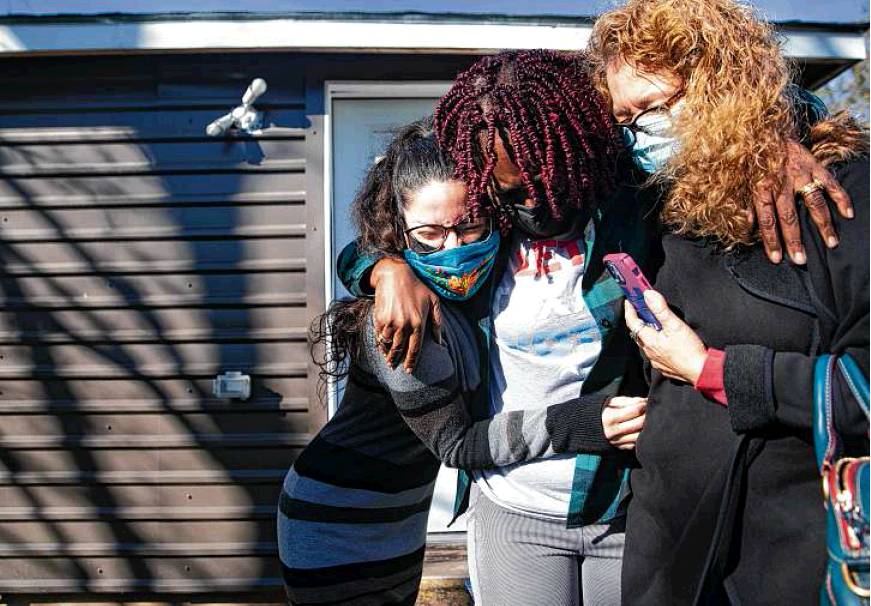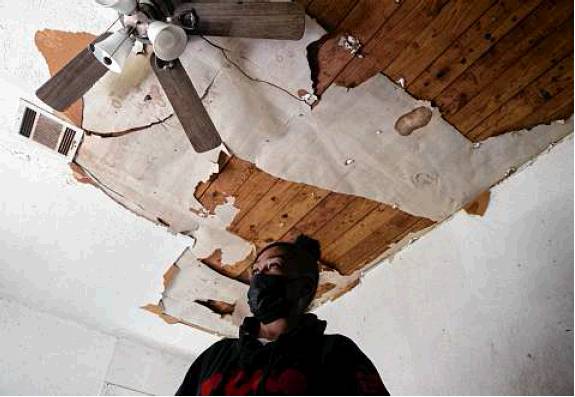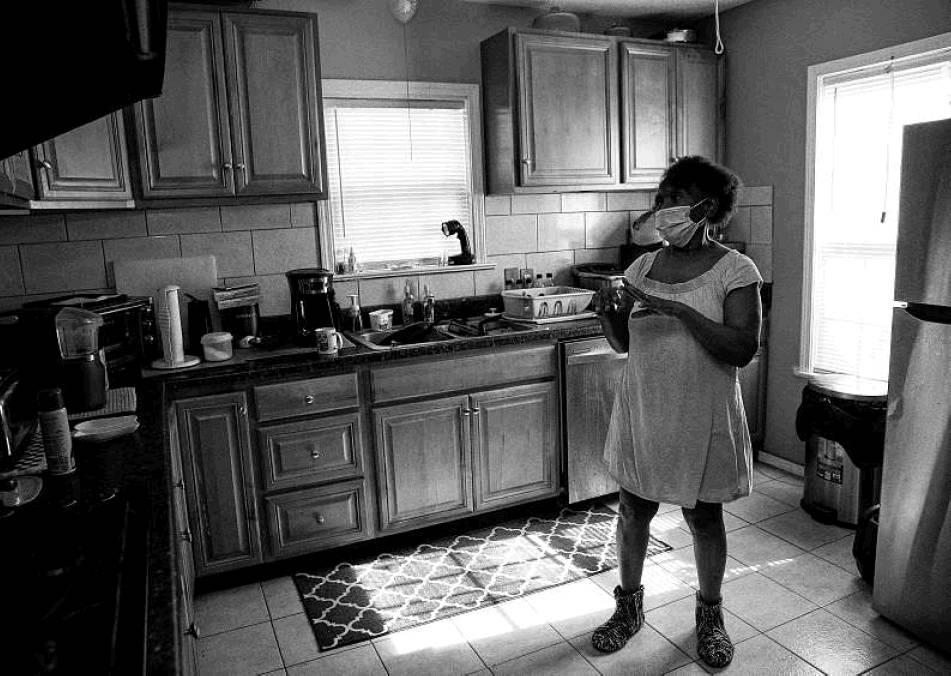Why hasn’t Harvey aid reached those in need?
Federal watchdogs want answers as homes damaged in hurricane remain in disrepair years later
By Emily Foxhall and R.A. Schuetz STAFF WRITERS
Betty Gregory waited years for the call from the city of Houston that came in September: The city was ready to rebuild her home, damaged in 2017 by Hurricane Harvey. Gregory and her husband just needed to sign the contract.
Gregory told the caller that her husband, a 77-year-old retired carpenter named Weldon, had recently died.
“I’m going to have to call you back,” she remembered the person replied.
Only later did Gregory learn her name wasn’t on the house’s deed. The recovery process stalled again.
Hers is one of many stories of headache and heartache among those who applied for financial help after Harvey struck as a deadly, $141 billion disaster. Now, federal watchdogs are looking into stories like Gregory’s, asking how and why people struggled to get assistance.
Both the city of Houston and Federal Emergency Management Agency are under scrutiny, with federal groups looking for lessons learned.
Gregory’s experience was far from an isolated instance, according to a Department of Housing and Urban Development audit of how the city handled $1.28 billion in HUD funding meant to help Houston recover from Harvey. Three years after the hurricane hit, Houston had spent only 1.8 percent of that money.
This left many residents still living in flood-damaged homes or with significant out-of-pocket expenses while hundreds of millions of dollars meant to help them sat unspent.
And the way federal aid did make its way to Houstonians actually widened wealth inequality, according to a memorandum to the U.S. Commission on Civil Rights from its Texas Advisory Committee. The committee looked at how both FEMA and HUD money was spent on disaster recovery. It found majority-white places received more money per capita than majority-minority places, worsening disparities.
That’s in part, it said, because of an overly complicated process and other aid policies that disproportionately prevented minorities, the elderly and people living with disabilities from receiving help. The commission has since opened an investigation into how government response to the hurricane impacted civil rights.
All of this leaves residents in limbo as more storms hit.
“The more I think about it,” said Gregory, 70, who has fought a number of environmental wrongs, “the madder I get.”
A slow process
Harvey hit the Texas coast around Rockport in August 2017. The ferocious storm then stalled over Houston, dropping massive amounts of rain. The flooding damaged or destroyed more than 200,000 businesses and homes, according to federal estimates.
Gregory rode out the hurricane at her two-bedroom house in Kashmere Gardens, a historically Black community northeast of downtown Houston. Wind blew and water seeped in, she recalled. The storm left cracks in her floors.
First, Gregory turned to the city for help. As she recalled, the city redirected her to FEMA. She was denied. Gregory applied to the city again, this time at a neighborhood location. Again, the city sent her to FEMA. Again she was denied.
Months passed before the city reached out.
As federal groups investigate Harvey recovery efforts, they’ve found the difficulties Gregory and her husband encountered were widespread.
The Texas Advisory Committee said that overly complicated applications and stretched-thin case managers created unnecessary hurdles. It recommended streamlining the process. For example, low-income families and seniors already receiving other forms of federal aid, such as food stamps, could automatically qualify for disaster recovery funds.
It also recommended eliminating practices that disproportionately prevent low-income people from receiving aid, citing FEMA’s practice of denying aid to homes that were in disrepair before the disaster.
And Houston was slow to distribute Harvey funding, according to the audit, in part because there was so much back-and-forth between the Democrat-led city and the Republican-led Texas General Land Office over how programs should be run.
For example, Houston asked the GLO for a waiver that would allow it to rebuild houses to the same size and number of bedrooms that existed before, a proposal the GLO shot down because it would result in fewer homes served and would fall out of line with federal regulations.
That, and disagreements like it, the audit said, played out while those impacted by Hurricane Harvey languished.
“We recognize that the intent of these efforts was to increase the effectiveness of the City’s programs,” wrote the authors of the audit. “However, the time spent planning these programs, which did not receive waiver approvals, delayed the City’s use of grant funds to help victims of Hurricane Harvey.”
The Houston Housing and Community Development Department said progress had been made since the audit, which examined the city’s work in the three years following Hurricane Harvey.
The recovery process can be harder than the disaster, according to federal testimony to the civil rights commission. People struggle to figure out how to apply, perhaps lacking technology, English proficiency or transportation.
‘Those with less get less’
Disasters leave families “in a state of deep trauma,” Ben Hirsch, co-director of West Street Recovery, wrote to the commission. Among issues, tracking down paperwork and documenting the damage frustrated those who felt their lives were in disarray.
“Because Black and Brown people are more likely to be unbanked, uninsured, have irregular employment and be disproportionately hurt by disasters, this application burden falls disproportionately on marginalized people,” he wrote.
Problems went well beyond that. The commission plans to issue a report later this year recommending policy fixes to Congress and the president.
Kathy Flanagan Payton, president and CEO of Fifth Ward Community Redevelopment Corp., observed in sum: “Those with less get less, and those with more, get more.”
A FEMA spokesperson wrote that the agency “continues to work on removing barriers to disaster assistance, ensuring all survivors have equal access to disaster aid and resources, and working across government to reach communities where they are to ensure survivors have the resources needed to recover.”
Gregory didn’t necessarily feel bad about not being accepted for help. Her husband slowly fixed up the house as his health and their finances allowed. He spent retirement money on new windows, floors and kitchen appliances.
That was before Gregory learned her home needed to be torn down and rebuilt.
Still, she said, others were worse off.
A 10-minute drive south of Gregory, in Fifth Ward, 59-year-old Gigi Collins lives in a home so damaged she won’t let her grandchildren play in some of the rooms. A tree fell during Harvey, shifting her house, she said.
Her kitchen tilted, requiring new cabinets. A crack appeared around the bathtub. Pieces of the ceiling in many places fell away. Collins cares for her 88-year-old mother here. She wished she had better living conditions, she said.
FEMA gave her $1,200, she said, which she used to get the tree removed. But when it came to getting help fixing her house, it felt like every year a different city caseworker called and told her she had to start over.
And Collins again found herself on Monday being told she needed to keep waiting — this time from someone with the GLO.
Collins had been waiting more than four years already, but she had no choice.
“I’ll keep the phone next to me,” she told him. emily.foxhall@chron.com rebecca.schuetz@chron.com


